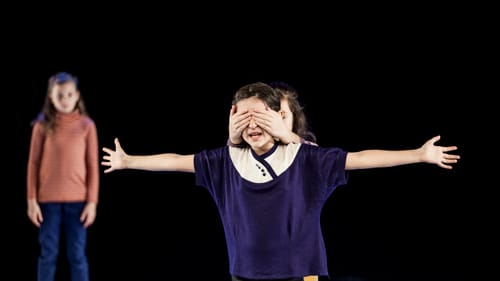Stay in the Loop
BSR publishes on a weekly schedule, with an email newsletter every Wednesday and Thursday morning. There’s no paywall, and subscribing is always free.
Flying high Under the Radar
Under the Radar Festival at the Public Theater

The temperatures may be frigid on the streets of New York this January, but inside the Public Theater, it’s hot.
The Under the Radar Festival has returned for its 12th season of urgent, risk-taking theater productions. Over 194 companies from 40 countries have been selected to participate to date, and the event has become the heartbeat of the downtown theatre culture, attracting waves of young audiences from all over the city and America.
Whereas past seasons have had a distinctly political overtone, I was surprised to find that the most compelling productions I saw this season have a deeply personal agenda. Their common theme: the artist in search of a parent he or she never knew.
A father in the shadows
In The Institute of Memory, author Lars Jan seeks the true identity of a father who was only a shadow figure in his life. Dressed in stark white, Jan and a companion actor conduct their search on an empty stage before a neon structure that serves as a beacon of light for their surreal journey through darkness. Together, they piece together a portrait of Lars’s enigmatic Polish-born father, who was tortured by the Nazis during World War II and survived. They visit the Institute of National Memory in Warsaw, where they listen to archived phone conversations and learn of the father’s activities as a Cold War operative. “Perhaps he thought it was best to preserve me from his particular darkness,” says Lars, trying desperately to process the information. “That was his gift to me.”
Jan preserves memories of his occasional encounters with his father like the strips of the neon that light the stage — flashes that come to him like the ghost of Hamlet’s father appearing to Hamlet, who is referred to throughout the play. “You weren’t present at my birth, and I wasn’t present at your death,” Lars offers as a rueful elegy. In the end, tragically, the paternal portrait is skeletal, like those haunting X-rays of his father’s body projected on the upstage backdrop.
Unexpected encounters
In Now I’m Fine, comedian/musician Ahamefule J. Oluo offers a lively, eclectic evening of storytelling punctuated by original jazz played by a 17-piece band under his direction. One moving story concerns the father he never knew, a Nigerian who married his Kansas-born mother and then abandoned her and returned to his village in Africa to become a chief. Oluo, who grew up in Seattle, spoke to his father once in his life. During that phone conversation, he told his father that he had become a musician, in an effort to live up to his name: “Ahamefule” means “Let my name not be forgotten.” But his father expressed disapproval, insisting that his son had misinterpreted his name’s true meaning (namely, to honor his father). “How did my father have the right to disapprove of me with the name he had given me?” Oluo asks in incomprehension.

In Employee of the Year, the offering by the dynamic company called “600 Highwaymen,” five 12-year-old girls tell the story of J, who discovers she was adopted after her house burns down and destroys everything she’s ever known. The search for her true mother takes her throughout her life until her 70s, when she accidentally sees a photo in a convenience store and is told that it is her biological mother. When she arrives at the house where her mother lives, however, she makes another discovery instead, about herself. The play ends with J, a young girl again, questioning the value of her journey. “What are the things I’ll remember in my life? Will I remember being on this stage when I’m 60?” J asks us.
Parents we didn’t know
Why do we search for the parents we never knew? All three artists offer the same tentative answer: It’s a journey to self-knowledge. “My father was buried in an unmarked grave — so was my grandfather. Will I be? Will my daughters be?” Lars asks at the end of The Institute of Memory. “If I had known what my name had meant, would I live my life differently? Would I be on this stage today?” Oluo asks in Now I’m Fine. “Don’t spend all your life chasing after your mother’s shadow,” J advises in Employee of the Year.
Of UTR’s 17 offerings, three will be coming to Philadelphia’s own FringeArts in the weeks ahead: God Bless Baseball (a play about baseball in Korea and Japan, January 21-23), Escuela (January 28-30, a play about Chile by Guillermo Calderón), and Employee of the Year (February 26-27). The journey of discovery — and self-discovery — continues.
What, When, Where
Under the Radar Festival. January 6-17 at the Public Theater, 425 Lafayette Street, New York. publictheater.org.
FringeArts, 140 North Columbus Boulevard, Philadelphia. FringeArts.com.
Sign up for our newsletter
All of the week's new articles, all in one place. Sign up for the free weekly BSR newsletters, and don't miss a conversation.
